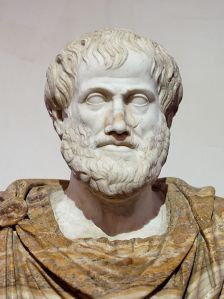In Part 1, I mentioned my (momentary) discombobulation when I learned about the 6th century Monoenergetic Heresy—long before ‘energy’ entered the physics lexicon. What’s going on? But as I said, “Of course you know the answer: Aristotle.”
Over the years, I’ve dipped in Aristotle’s works several times. Caveat: I’m a dilettante here. Or to borrow the disclaimer that used to grace horoscope columns, what follows is “for entertainment purposes only”.
Aristotle, Weight Loss Guru
From the Metaphysics (Bk 9 Pt 6, 1048b 18-23):
Since of the actions which have a limit none is an end but all are relative to the end, e.g. the removing of fat, or fat-removal, and the bodily parts themselves when one is making them thin are in movement in this way (i.e. without being already that at which the movement aims), this is not an action or at least not a complete one (for it is not an end); but that movement in which the end is present is an action.
Aristotle, the Pooh Connection
I first encountered the term entelechy (ἐντελέχεια) in The Pooh Perplex, in the article “A Complete Analysis of Winnie-the-Pooh” by Duns C. Penwiper:
Preferring Aristotle to anyone else is merely, as Professor Crane says, “like a modern physicist’s preference for Einsteinian over Newtonian concepts”; it is a perfectly objective choice of right over wrong that bears no slightest trace of personal involvement or condescension.
We are now prepared, I believe, to return to Winnie-the-Pooh with some philosophical confidence that we know what we are about. It is clear that the object of study here (the artistic whole qua artistic whole) falls essentially into the category of art, or broadly speaking, poesis. We may thus set ourselves the all-important task of deciding just which, among the many potential forms of art, inhabits the essential entelechy of Pooh.
Aristotle, Coiner of Words
Aristotle coined the word energeia, ἐνέργεια. And the word ἐντελέχεια, entelechy. According to Joe Sachs (quoted in Wikipedia):
Aristotle invents the word by combining entelēs (ἐντελής, ‘complete, full-grown’) with echein (= hexis, to be a certain way by the continuing effort of holding on in that condition), while at the same time punning on endelecheia (ἐνδελέχεια, ‘persistence’) by inserting telos (τέλος, ‘completion’). This is a three-ring circus of a word, at the heart of everything in Aristotle’s thinking, including the definition of motion.
Then there is George Blair’s “Aristotle on Entelexeia: A Reply to Daniel Graham” (The American Journal of Philology, Vol. 114, No. 1 (Spring, 1993), pp. 91-97). Here’s Graham:
Aristotle coined the terms; how could the etymologies not be sound? All too easily. … Just as one can produce an number of grammatically correct utterances without being able to explain why they are grammatical, one can coin an infinite number of new words without being able to explain why they are correctly formed and meaningful.
and Blair’s reply:
…one would think that if Aristotle coined the word, it would be more plausible to take the word in Aristotle’s sense and see if that fit the way he used it better than the traditional meaning, and call the tradition wrong rather than the one who made up the word in the first place.
Plenty more where that came from. As for energeia, I can’t do better than quote from Wikipedia again:
Aristotle says the word can be made clear by looking at examples rather than trying to find a definition. Two examples of energeiai in Aristotle’s works are pleasure and happiness (eudaimonia). Pleasure is an energeia of the human body and mind whereas happiness is more simply the energeia of a human being a human.
Although I also like this quote (P.S. Mamo, “Energeia and Kinesis in Metaphysics θ. 6″, Apeiron: A Journal for Ancient Philosophy and Science, Vol. 4, No. 2 (August,1970), pp. 24-34):
… enjoying is a kinesis and walking is an energeia…
Clear?
Aristotle, Maker and Ignorer of Distinctions
“The Relation between the Terms ἐνέργεια and ἐντελέχεια in the Philosophy of Aristotle”, by Chung-Hwan Chen (The Classical Quarterly, Vol. 8, No. 1/2 (May, 1958), pp. 12-17) has one of those delightful footnotes that takes up most of the page. (Well, actually more than one such footnote.) Behold:
In the paper referred to (see p.10 , n.1) we showed in detail that the term ἐνέργεια is used by Aristotle chiefly in nine or ten different senses, which are to be classified as follows:
- Quasi-modal (or ‘static’) meaning:
- actuality;
- being actualized or
- being perfect;
- in application to form;
[etc. etc.]
The term ἐντελέχεια has all these senses except II.4, which is, indeed, not a new sense different from all the rest, but II.3 in a special application. So the two terms are used practically in the same senses…
Joe Sachs, at the Internet Encyclopedia of Philosophy:
Aristotle uses the words energeia and entelechia interchangeably to describe a kind of action. A linguistic analysis shows that, by actuality, Aristotle means both energeia, which means being-at-work, and entelechia, which means being-at-an-end. These two words, although they have different meanings, function as synonyms in Aristotle’s scheme.
At least I’ve answered my initial question. Aristotle’s energeia is pretty far removed from our energy.
(If I ever get the energy, I’ll delve a little deeper.)

